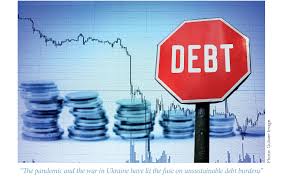ISLAMABAD, February 1 (INP): The International Monetary Fund (IMF) forecasted that Pakistan’s economy will grow by 2.0 percent in FY2023, 1.5 percent lower than what it projected in the October 2022 World Economic Outlook (WEO), according to a report, received by Gwadar Pro from its correspondent in Washington.
Also the IMF projected the country’s economic growth to 4.4 percent in FY2024, 0.2 percent higher than the October 2022 forecast.
The 2022 projections for Pakistan are based on information available as of the end of August 2022 and do not include the impact of the floods, reads the October 2022 World Economic Outlook (WEO).
According to the newly released update to its World Economic Outlook report, global growth is projected to fall from an estimated 3.4 percent in 2022 to 2.9 percent in 2023, then rise to 3.1 percent in 2024.
The forecast for 2023 is 0.2 percent higher than predicted in the October 2022 WEO but below the historical (2000–19) average of 3.8 percent.
The rise in central bank rates to fight inflation and Russia-Ukraine conflict continue to weigh on economic activity. The rapid spread of COVID-19 in China dampened growth in 2022, but its recent reopening has paved the way for a faster-than-expected recovery.
The IMF now expects China’s economy – the world’s second-biggest, after the United States – to grow 5.2 percent this year, up from its October forecast of 4.4 percent.
“The restrictions and COVID-19 outbreaks in China dampened activity last year. With the economy now re-opened, we see growth rebounding to 5.2 percent this year as activity and mobility recover,” Pierre-Olivier Gourinchas, IMF chief economist, wrote in a blog Tuesday.
For advanced economies, the slowdown will be more pronounced, with a decline from 2.7 percent last year to 1.2 percent and 1.4 percent this year and next. Nine out of 10 advanced economies will likely decelerate. US growth will slow to 1.4 percent in 2023 as Federal Reserve interest-rate hikes work their way through the economy, Gourinchas said.
He also pinpointed that emerging market and developing economies have already bottomed out as a group, with growth expected to rise modestly to 4 percent and 4.2 percent this year and next. “Together with China, India will account for half of global growth this year, versus just a tenth for the US and euro area combined.”
“We must buttress multilateral cooperation, especially on fundamental areas of common interest such as international trade, expanding the global financial safety net, public health preparedness and the climate transition,” Gourinchas wrote.
This time around, the global economic outlook hasn’t worsened. The road back to a full recovery with sustainable growth, stable prices and progress for all is only starting, he concluded in the blog.

























